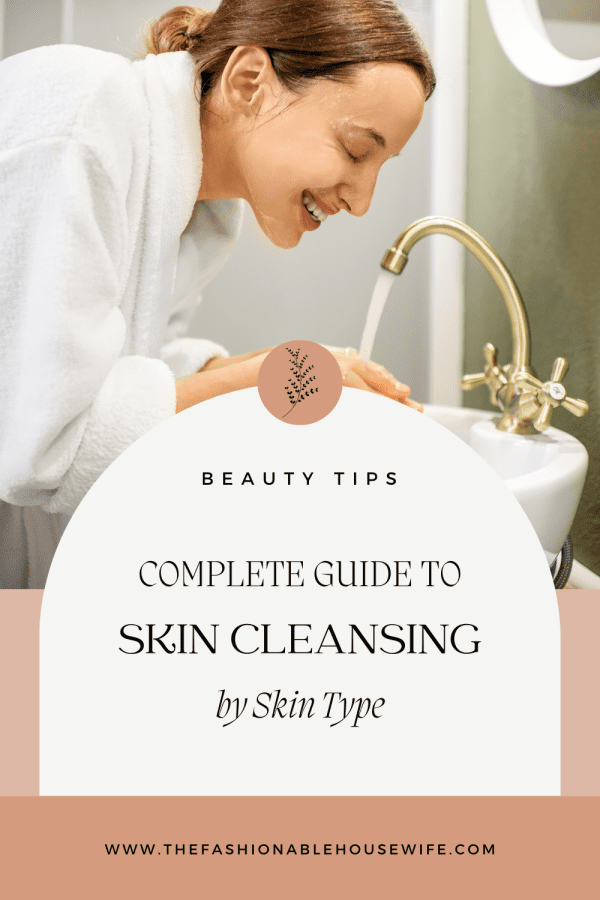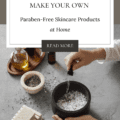
Did you know that your skin type should dictate the type of skin cleanser you use? Understanding your skin type is actually crucial for effective skin cleansing. So in this article, we will delve into diverse skin types and offer a simple method to identify your unique skin type. We will also explore various types of cleansers – including foaming, cream-based, and oil cleansers – and examine their benefits, chemical compositions, and properties. Furthermore, we will pair these cleansers with specific skin types, providing guidance on how to cleanse your skin effectively based on your skin type.
Understanding Skin Types
The human skin, a complex and dynamic organ, exhibits a variety of types, each with unique characteristics and needs. Primarily categorised as normal, dry, oily, combination, and sensitive, these skin types are influenced by factors such as genetics, environment, lifestyle, and health.
Normal Skin
Normal skin, often considered the ideal type, strikes a perfect balance in terms of hydration and oiliness. Its well-functioning sebaceous glands produce sebum at a rate that maintains the skin’s natural barrier without excess oiliness. The skin’s composition in this type is typically uniform, with a balanced distribution of lipids and moisture. This results in a smooth texture, even tone, and a generally resilient nature against environmental stressors.
Dry Skin
Dry skin suffers from a lack of sebum production and an impaired barrier function. This deficiency in natural oils affects the skin’s lipid composition, leading to increased transepidermal water loss. As a result, the skin struggles to retain moisture, leading to tightness, flaking, and often increased sensitivity. The lack of adequate lipids can also impact the skin’s ability to protect itself from environmental irritants and can lead to premature signs of ageing due to reduced elasticity.
Oily Skin
Oily skin is characterised by an overproduction of sebum. This excess oil alters the skin’s lipid balance, often leading to a shiny appearance and a thicker, more dense composition. The increased oil production can lead to clogged pores and acne, as the sebum mixes with dead skin cells and becomes trapped in the follicles. Despite its challenges, oily skin often maintains better hydration levels and may show signs of ageing slower due to the protective layer of lipids.
Combination Skin
Combination skin presents a complex composition, combining areas of both oily and dry skin. Typically, the T-zone (forehead, nose, and chin) has an increased sebum production, while the cheeks and other areas may be normal or dry. This variance in oil production and moisture levels across different facial zones requires a more strategic approach to skincare, balancing the need to hydrate dry areas without exacerbating oiliness in others.
Sensitive Skin
Sensitive skin is often reactive to external factors and can have an impaired barrier function. This skin type may have a lower threshold for irritation due to a thinner or less effective protective lipid layer. It’s prone to redness, itching, and discomfort, reacting to triggers that other skin types might easily tolerate. The composition of sensitive skin often requires gentle, non-irritating ingredients to maintain its health and prevent flare-ups.

Types of Cleansers
Now that we have a better understanding of our skin types, let’s delve into the topic of cleansers. Cleansers serve as the foundation of any skincare routine, as they are responsible for removing dirt, oil, and makeup while preserving the skin’s natural balance. This is why choosing a face cleanser and tailoring the choices to meet specific skin needs and preferences is of utmost importance.
Below are different types of cleansers and the compositions that make them stand out:
Foaming Cleansers
Foaming face cleansers stand out for their light, airy lather. They are excellent for efficiently lifting away excess oil, dirt, and makeup. Typically formulated with surfactants like sodium lauryl sulphate, they create a rich foam that deeply cleanses the skin. These cleansers are particularly suited for oily and combination skin types, as they can effectively control excess sebum without being overly harsh.
For instance, House of Immortelle’s plant hydrosol-based foaming cleanser exemplifies a gentler foaming cleanser. It lathers delicately, effortlessly melting away makeup and impurities while maintaining the skin’s balance. This product also leaves the skin feeling refreshed, toned, and clean without any oily residue, promoting a healthy and fresh complexion.
Cream Based Cleansers
Cream based face cleansers are enriched with moisturising agents such as glycerin or shea butter. These ingredients contribute to a soothing and hydrating cleansing experience, ideal for dry and sensitive skin. By avoiding harsh surfactants, cream-based cleansers gently cleanse the skin while preserving its natural oils and moisture barrier.
An excellent example is House of Immortelle’s cream based cleanser which boasts a lightweight, milky texture that effortlessly eliminates environmental pollutants, dead skin cells, and makeup. Infused with Avocado and Macadamia oils, it also supports the skin’s natural moisture barrier, ensuring hydration and protection.
Oil Cleansers
Oil face cleansers use various oils, like jojoba, almond, or olive oil, to dissolve makeup, sebum, and impurities. These cleansers are adept at providing a deep clean without stripping the skin of its natural oils. They are exceptionally beneficial for dry skin due to their nourishing qualities but are versatile enough for all skin types, particularly as part of a double-cleansing routine.
House of Immortelle’s oil cleanser is a prime example, combining Rosemary extract and Vitamin E to combat free radical damage and maintain hydration. Sweet Almond Oil and Grapeseed oil contribute to nourishing and rebalancing the skin’s lipid levels. This cleanser effectively counters the damaging effects of pollutants, ensuring the skin remains hydrated and smooth.

Skin Cleansers by Skin Type
Selecting the right skin cleanser is more than a matter of personal preference; it’s about understanding and responding to the unique needs of your skin type. So, let’s explore the ideal cleanser choices for each skin type.
Normal Skin
For those of us with normal skin we can use a variety of cleansers. A refreshing foaming cleanser is great for daily use, while a hydrating cream-based cleanser can be used for extra moisture when needed.
Dry Skin
Dry skin needs hydrating cleansers which is why gentle milky cleansers or oil cleansers work best, as they add moisture and nourish the skin while cleaning.
Oily Skin
Oily skin benefits from foaming cleansers that remove excess oil without stripping away moisture. Look for products that balance oil control with hydration like a gentle cleansing oil if you have this skin type.
Combination Skin
Combination skin requires a mix of cleansers: a foaming one for the oily T-zone and a cream-based for drier areas, ensuring all parts of the face are properly cared for.
Sensitive Skin
Sensitive skin needs gentle, fragrance-free, and non-irritating cream-based cleansers. These soothe the skin while effectively removing dirt and impurities.

Understanding your skin type and choosing the suitable cleanser can revolutionise your skincare routine. It’s not merely about cleanliness; it’s about choosing a product that respects and enhances your skin’s natural balance.
House of Immortelle captures and utilises the age-defying skin healing and mind soothing properties of active Australian botanicals. The majority of skincare products include water as the main ingredient leaving very little room for active, working ingredients. This is where the House of Immortelle skincare differs. Our ranges utilise plant hydrosols as a base ingredient making our products more effective on the skin as they have a natural synergy with other natural, active ingredients we use in the formulation.
Available online via https://www.houseofimmortelle.com.au






